Rumours and spies in the Balkans as Russia seeks influence
- Published
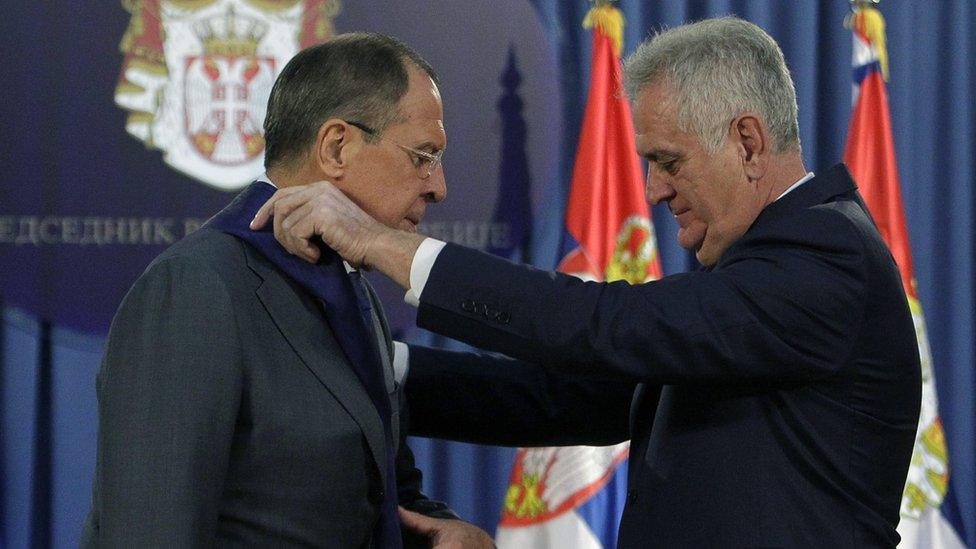
Sergei Lavrov met several leading Serbian officials at the start of his two-day visit to Belgrade
Russia's foreign minister, Sergei Lavrov, is on a high-profile visit to Serbia, which comes in the wake of some of the wildest allegations of espionage seen in the Western Balkans since James Bond was pursued through what was then Yugoslavia on the Orient Express.
Fifty years after From Russia With Love, freelance operatives are once again to the fore on a rap sheet covering coup-plotting, election-rigging and thinly-veiled threats against Serbia's prime minister.
The only element missing is the poison-tipped toe caps of agent Rosa Klebb.
Montenegro 'plot'
In October, Montenegro held a general election which then-Prime Minister Milo Djukanovic billed as a referendum on the country's accession to Nato and pursuit of EU membership.
Both issues have infuriated Russia, where Deputy Prime Minister Dmitry Rogozin warned that Montenegro would "regret" joining Nato.
On polling day, police arrested 20 Serbian citizens whom they suspected of plotting a coup and the assassination of Mr Djukanovic. Those detained included a former commander of a Serbian special forces unit. Serbia quickly moved to deny any involvement in the affair.
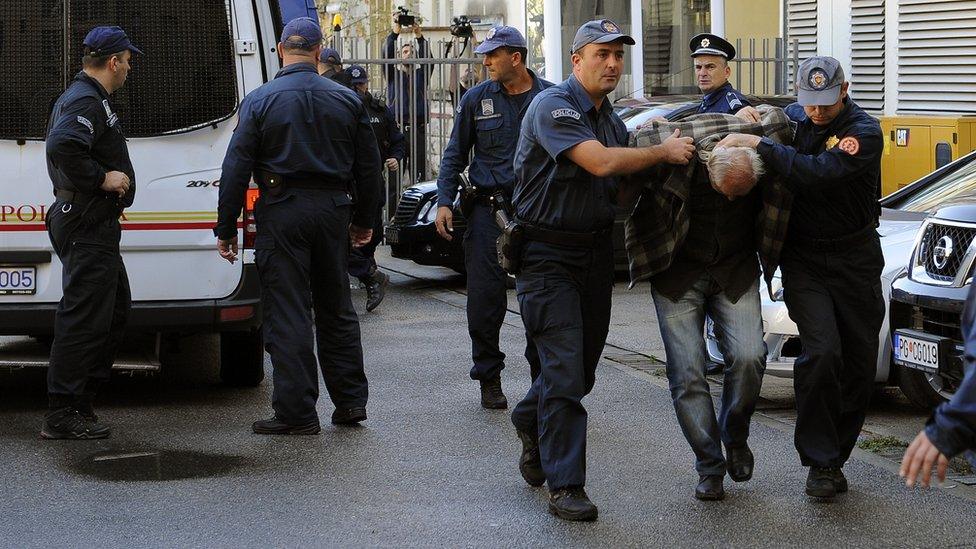
Serbia denied involvement when Montenegro accused Serb and Russian nationalists of a coup plot
Within days, Serbian Prime Minister Aleksandar Vucic announced that arrests had also been made in Serbia - and that those people had connections with an unnamed third country. He also claimed that intelligence agencies from both East and West were increasing their activities in Serbia.
This put the rumour mill into overdrive - and local newspapers reported allegations that Serbia had secretly deported several Russian citizens for nefarious activities.
This was followed by the unexpected arrival in Belgrade of the head of Russia's Security Council, Nikolai Patrushev, as Montenegro accused Russian and Serbian nationalists of organising the alleged coup attempt.
Belgrade arms find
Just when it seemed that eyebrows could not possibly rise any higher, police discovered a cache of arms hidden close to Mr Vucic's parents' home on the outskirts of Belgrade. The temptation to see this as an attempt to intimidate the prime minster was hard to resist.
Jelena Milic, of the Belgrade-based Centre for Euro-Atlantic Studies, says that at the very least Mr Patrushev's visit indicated that Russia was trying to manage Serbia's response to the coup allegations.
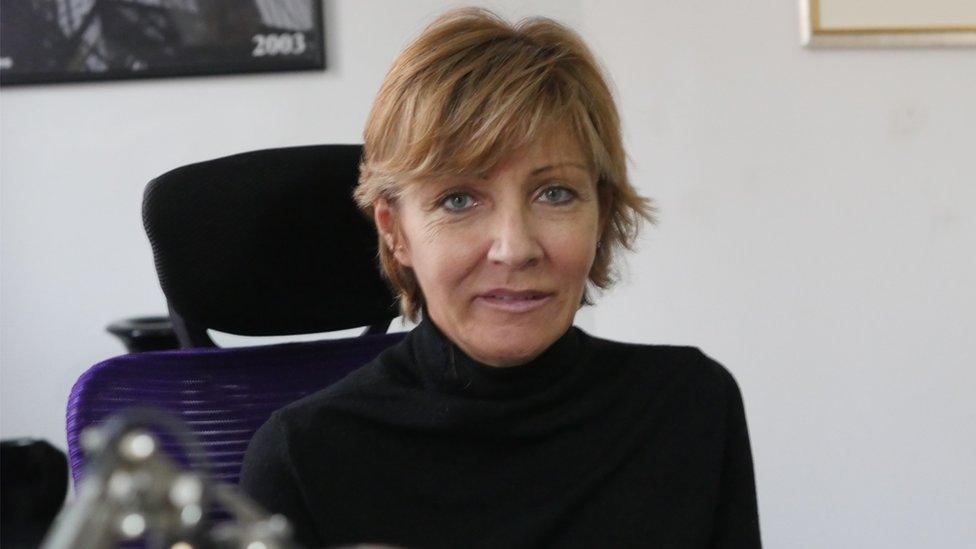
Jelena Milic believes the head of Russia's Security Council was trying to keep the story quiet
"He was eager to suppress the fact that somebody was in Serbia, caught red-handed with the equipment and plans," said Ms Milic.
"So Patrushev came out of the blue to suppress the fact that little green men were caught here and they had left the country. Because it is big - it would really prove to everyone how big the hybrid approach by Russia to destabilise the entire EU is."
Theories that Russia has turned to nefarious means of influence are given legs by its obvious disapproval of the "Euro-Atlantic path" being followed by the countries of the Western Balkans, as they head towards membership of the EU, Nato or both.
Is it Russia or organised crime?
Montenegro's imminent accession means that all the countries along the Adriatic coast will be Nato members.
But Russia has plenty of supporters in Serbia.
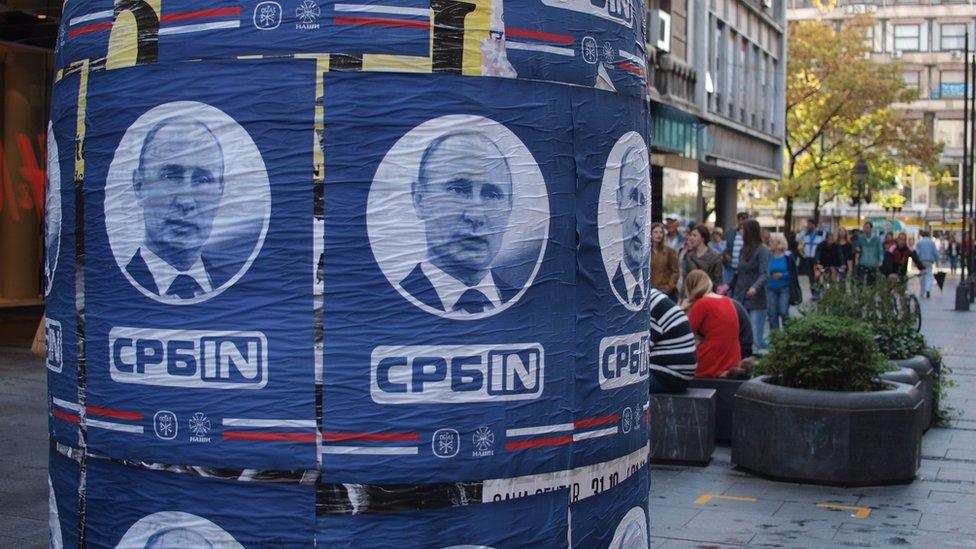
Posters of Russian President Vladimir Putin are visible in Belgrade's main shopping street
Opinion polls suggest more people favour closer ties with Moscow than membership of the EU. Suggestions that the dark arts of the Cold War are back in play get a sceptical reception.
"I don't see the hand of Russia in all this," says Misa Djurkovic, the director of Belgrade's Institute of European Studies and author of The Illusion of the European Union.
"I don't see that it's in Russia's interests to overthrow the governments in Montenegro or Serbia. They are working with those in power. And they are most interested in their own backyard, which they are not yet capable of controlling."
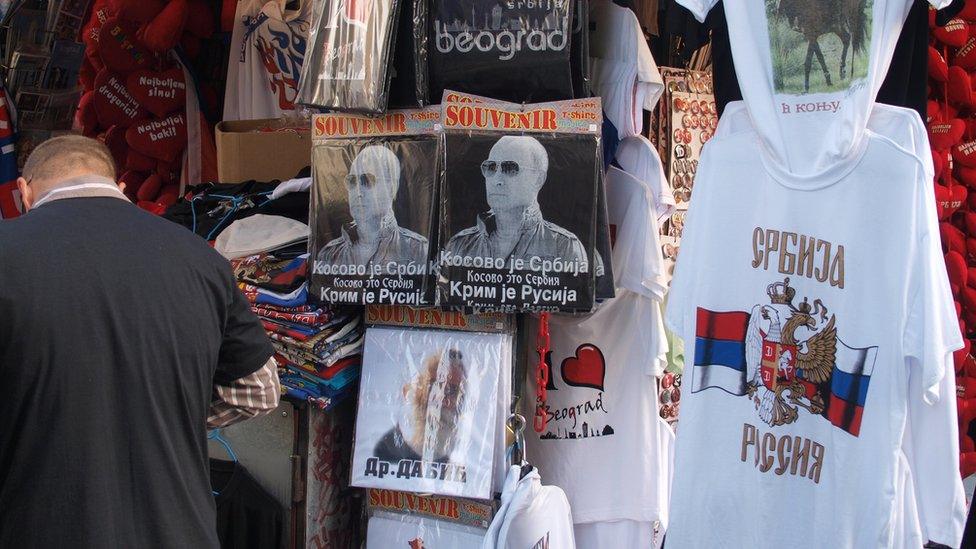
A pro-Russian message finds a sympathetic ear in Belgrade
"In Serbia, everything that has recently been going on was connected in the media with mafia and drug-trafficking structures. That's not, as far as I know, connected with Russia."
This analysis is certainly in line with more recent comments from Serbia's prime minister, in which he suggested his family had become the target of an unnamed organised crime figure.
But even if the more outrageous allegations remain unproven, it does appear that Russia is keen to maintain some influence in the Western Balkans.
The Russian-funded media outlet, Sputnik News, set up a Serbian-language service in 2014. Its slant on stories is distinctly pro-Moscow - and it finds a sympathetic audience among Serbians and Montenegrins who still vividly remember the Nato bombing campaign of 1999 - and romanticise a "Slavic brotherhood" with Russia.
"All our enemies in the Balkans were helped by the British, Americans, Germans and so on, and that's why people try to turn to the other side and project on that side many things that are not realistic," says Misa Djurkovic.
Where will the Western Balkans turn?
Among all the rumours and recriminations in the western Balkans, making a sober analysis of the precise state of the region's relations with Russia is a thankless task.
"It's very easy to fall into Balkan conspiracy theorising," says James Ker-Lindsay, an expert on the politics of southeast Europe at the London School of Economics.
"We know that Russia is trying to expand its sphere of influence in the western Balkans. So there is a certain plausibility to claims that Russia is getting involved."
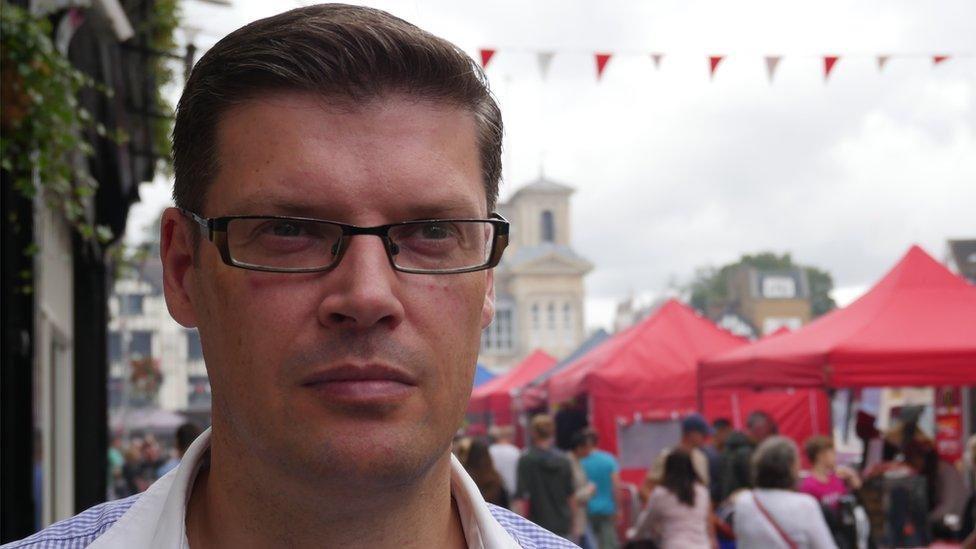
James Ker-Lindsay of the LSE believes Serbia's long-term aim is to be closer to the EU
"But the coup plot was incredibly amateurish. If you think that Russia was engaged in a process to overthrow the Montenegrin government, you'd think they would do it in a little more sophisticated fashion than sending over a few Serb nationalists."
In any case, none of the recent events appear to have stopped Serbia advancing its EU membership negotiations, with more "chapters" in the accession process due to open this week. James Ker-Lindsay believes that when all the skulduggery has been forgotten, economic pragmatism will dictate the region's next moves.
"There is a great deal of pragmatism in Serbian government circles. They don't want to alienate Russia, but when push comes to shove, it's quite clear that economic development is the priority - and investment comes from the EU, not from Russia."
- Published27 October 2016